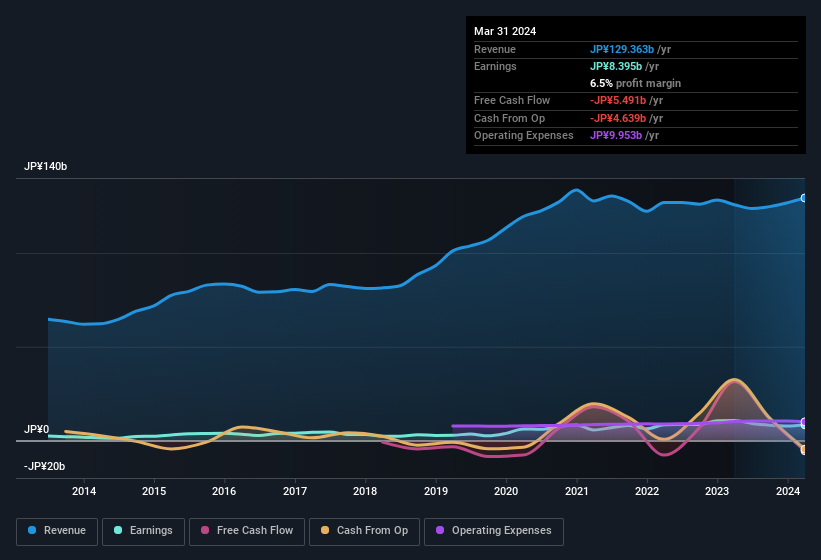- Japan
- /
- Construction
- /
- TSE:1968
Taihei Dengyo Kaisha's (TSE:1968) Sluggish Earnings Might Be Just The Beginning Of Its Problems

The market rallied behind Taihei Dengyo Kaisha, Ltd.'s (TSE:1968) stock, leading do a rise in the share price after its recent weak earnings report. We think that shareholders might be missing some concerning factors that our analysis found.
See our latest analysis for Taihei Dengyo Kaisha

Examining Cashflow Against Taihei Dengyo Kaisha's Earnings
In high finance, the key ratio used to measure how well a company converts reported profits into free cash flow (FCF) is the accrual ratio (from cashflow). In plain english, this ratio subtracts FCF from net profit, and divides that number by the company's average operating assets over that period. The ratio shows us how much a company's profit exceeds its FCF.
That means a negative accrual ratio is a good thing, because it shows that the company is bringing in more free cash flow than its profit would suggest. That is not intended to imply we should worry about a positive accrual ratio, but it's worth noting where the accrual ratio is rather high. To quote a 2014 paper by Lewellen and Resutek, "firms with higher accruals tend to be less profitable in the future".
Over the twelve months to March 2024, Taihei Dengyo Kaisha recorded an accrual ratio of 0.22. Therefore, we know that it's free cashflow was significantly lower than its statutory profit, which is hardly a good thing. Even though it reported a profit of JP¥8.40b, a look at free cash flow indicates it actually burnt through JP¥5.5b in the last year. It's worth noting that Taihei Dengyo Kaisha generated positive FCF of JP¥31b a year ago, so at least they've done it in the past. The good news for shareholders is that Taihei Dengyo Kaisha's accrual ratio was much better last year, so this year's poor reading might simply be a case of a short term mismatch between profit and FCF. As a result, some shareholders may be looking for stronger cash conversion in the current year.
That might leave you wondering what analysts are forecasting in terms of future profitability. Luckily, you can click here to see an interactive graph depicting future profitability, based on their estimates.
Our Take On Taihei Dengyo Kaisha's Profit Performance
Taihei Dengyo Kaisha didn't convert much of its profit to free cash flow in the last year, which some investors may consider rather suboptimal. Because of this, we think that it may be that Taihei Dengyo Kaisha's statutory profits are better than its underlying earnings power. But at least holders can take some solace from the 49% per annum growth in EPS for the last three. The goal of this article has been to assess how well we can rely on the statutory earnings to reflect the company's potential, but there is plenty more to consider. So while earnings quality is important, it's equally important to consider the risks facing Taihei Dengyo Kaisha at this point in time. Be aware that Taihei Dengyo Kaisha is showing 4 warning signs in our investment analysis and 1 of those doesn't sit too well with us...
This note has only looked at a single factor that sheds light on the nature of Taihei Dengyo Kaisha's profit. But there are plenty of other ways to inform your opinion of a company. Some people consider a high return on equity to be a good sign of a quality business. While it might take a little research on your behalf, you may find this free collection of companies boasting high return on equity, or this list of stocks with significant insider holdings to be useful.
Valuation is complex, but we're here to simplify it.
Discover if Taihei Dengyo Kaisha might be undervalued or overvalued with our detailed analysis, featuring fair value estimates, potential risks, dividends, insider trades, and its financial condition.
Access Free AnalysisHave feedback on this article? Concerned about the content? Get in touch with us directly. Alternatively, email editorial-team (at) simplywallst.com.
This article by Simply Wall St is general in nature. We provide commentary based on historical data and analyst forecasts only using an unbiased methodology and our articles are not intended to be financial advice. It does not constitute a recommendation to buy or sell any stock, and does not take account of your objectives, or your financial situation. We aim to bring you long-term focused analysis driven by fundamental data. Note that our analysis may not factor in the latest price-sensitive company announcements or qualitative material. Simply Wall St has no position in any stocks mentioned.
About TSE:1968
Taihei Dengyo Kaisha
Engages in the plant construction business in Japan and internationally.
Excellent balance sheet with proven track record.
Market Insights
Community Narratives



